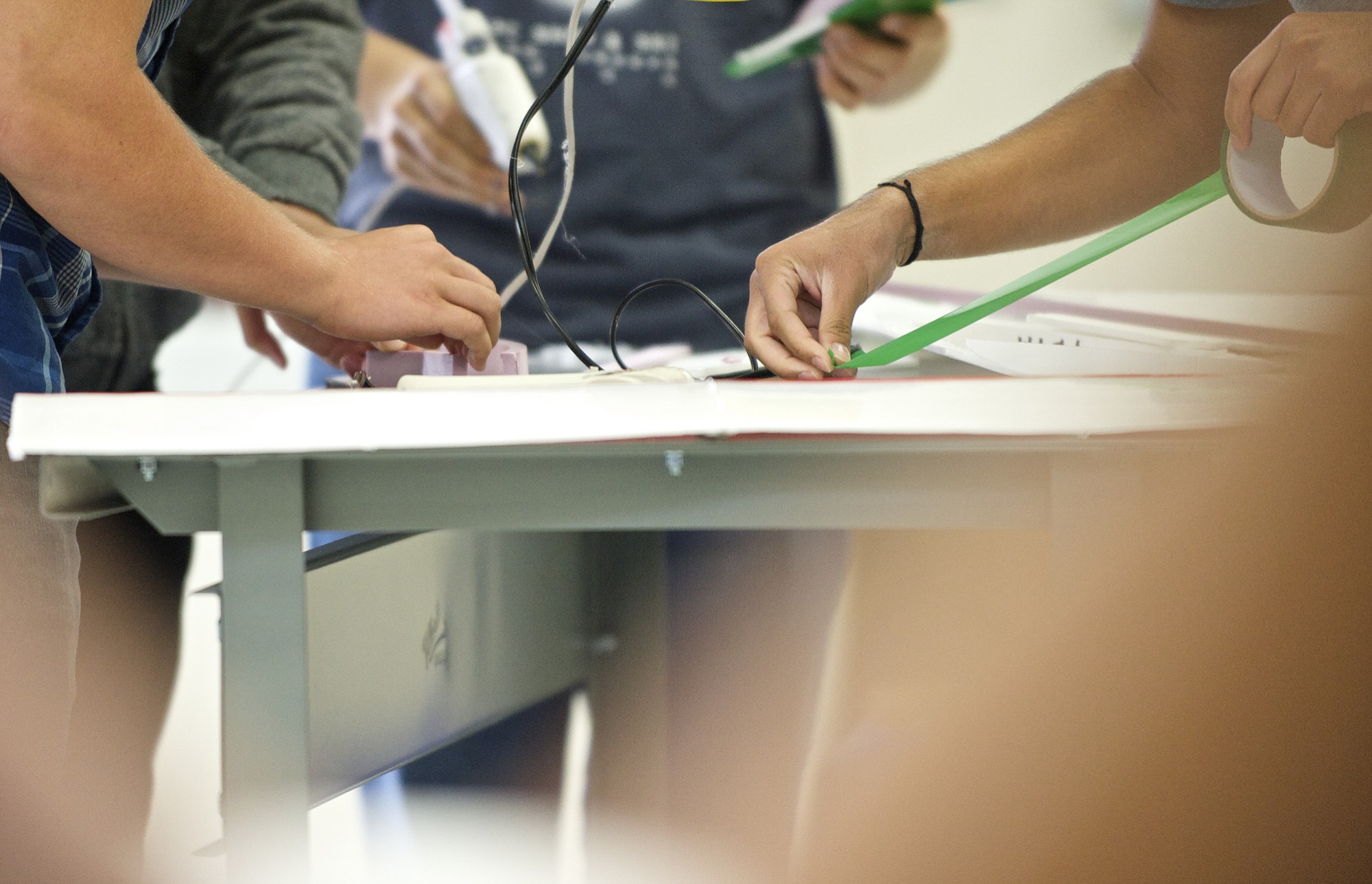New at Clark County Skills Center
Homeland Security
o One-year program.
o Potential careers: Security screener, public health engineer and cyber-security specialist.
o More information: ccskillscenter.com/homeland.html
Aviation Technology
o Two-year program.
o Potential careers: pilot, aerospace engineer, aviation technician, aviation manufacturing, air traffic control.
o More information: ccskillscenter.com/aviation.html
In a hangar at the Clark County Skills Center, students stood at tables calculating the wing size for the radio-controlled planes they were building. Made of inexpensive household materials — sheets of foam, sheet insulation and duct tape — these planes will soon fly. And, hopefully, so will the students’ careers.
The aviation technology program is one of two new programs at the school. The other, homeland security, is only the second high school program on the subject in the nation.
New at Clark County Skills Center
Homeland Security
o One-year program.
o Potential careers: Security screener, public health engineer and cyber-security specialist.
o More information: ccskillscenter.com/homeland.html
Aviation Technology
o Two-year program.
o Potential careers: pilot, aerospace engineer, aviation technician, aviation manufacturing, air traffic control.
o More information: ccskillscenter.com/aviation.html
Both programs are housed in new facilities that include classrooms and the cavernous hangar.
Monica Harrison, 16, aspires to a career as a commercial airline pilot.
“My dad used to be a flight engineer at Boeing,” Harrison said. “He’s always taken me to aviation museums.”
In the mornings, she studies aviation at the Skills Center. In the afternoons, she’s a Running Start student at Clark College studying trigonometry and chemistry.
Harrison’s project partner, 17-year-old Noah Brands, had just completed his calculations. He turned the beginnings of his airplane in his hands.
“For our wing, it’s 272 square inches,” said Brands, who is considering a career as a pilot or an aviation mechanic.
Marlin Martin, a self-described student pilot, volunteers in the aviation classroom at least once per week. Tuesday, he supervised students as they worked on their planes and discussed their aspirations: Karl Boylan, 16, wants to be an Air Force pilot; Adolfo Ceron, 18, an aerospace engineer; and Oksana Mishchenya, 17, a commercial airline pilot. Mishchenya is applying for the aviation program at Portland Community College.
“I think taking this class will put me as a frontrunner,” said Mishchenya, who spends half of her school days immersed in aviation and the other half at Prairie High School.
Instructors at the Skills Center are working on agreements with regional community colleges that would allow their students to earn college credits for the classes they take in aviation or homeland security.
By the end of the school year, they will have the opportunity to earn multiple technical certifications and their private pilot ground school certificate. Then students can take flying lessons.
Karene Duffy, Skills Center director, said the program’s three flight simulators should arrive by mid-November. The program has 45 students, but eventually it will have 75 to 90 students, she said.
“They have a pretty good path,” said instructor Rob Reinebach, looking around the hangar at his busy students. “By age 23 to 27, they could be airline pilots for regional airlines.”
The median wage for commercial pilots who fly scheduled flights is about $73,000 a year, said Scott Bailey, regional economist with the Washington Employment Security Department.
Homeland security
Next to the hangar, another new building houses the homeland security program. With 40 students, the one-year program is at capacity.
Ashley Kingsley, homeland security teacher, has developed curriculum in related fields and has taught in several colleges. She has a master’s degree in homeland security management and is working on her doctorate.
She had a rewarding career at Galveston National Laboratory in Texas, a maximum-containment laboratory that is conducting Ebola research.
But when she was offered the teaching job at the Skills Center, she drove 38 hours to reach Vancouver.
“I am really passionate about homeland security education,” Kingsley said. “It’s one of two high school programs in the country. I really did want to do it. “
Her students are learning about opportunities in the field that reach far beyond being airport security screeners, including emergency management, cyber-attack analysis, epidemiology and public health.
“Students are going to be given the opportunity to participate in a flagship program and learn about the different interactions of homeland security in their community and in their country,” Kingsley said.
As might be expected, the program has raised interest with other high school skills centers in the state, said Jill Neyenhouse, the instructional coach for the Skills Center.
“This feeds into a lot of different areas,” Neyenhouse said. “There’s a wide range. It’s a jumping-off place. Students are intrigued about the topic.”




